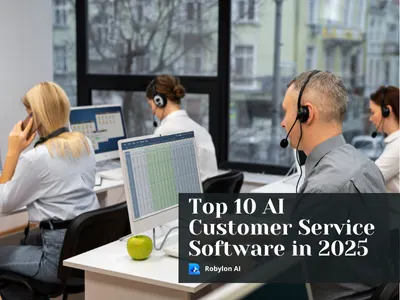TL;DR
A major OAuth breach forced Salesloft to take Drift offline in September 2025. Security concerns, high costs, and limited product scope have led many teams to search for Drift competitors that deliver stronger AI chatbots, omnichannel messaging, and CRM integrations.
This article reviews the 10 best Drift competitors in 2025, from enterprise giants like Zendesk and Intercom to AI-native providers like Robylon AI and Tidio. Each tool is assessed on features, integrations, and where it fits best.
See how Robylon AI unifies chat, voice, and tickets in one platform → book-demo to know more
Introduction
Customer experience leaders need tools that handle conversations at scale without sacrificing security or draining budgets. Once considered the category leader in conversational marketing, Drift now faces scrutiny. After the September 2025 security incident linked to Salesforce and Google Workspace tokens, even enterprise users began migrating to Drift alternatives that promise stronger safeguards and better ROI.
At the same time, the market has evolved. AI-first chatbot platforms can now manage lead qualification, resolve support tickets end-to-end, and connect seamlessly to channels like WhatsApp, Instagram, and email. Pricing models have also shifted from per-seat licenses to usage-based AI billing, giving growing teams more flexibility.
This guide compares the 10 best Drift alternatives for 2025, with a focus on features, industry use cases, and fit for different team sizes.
What is Drift?
Drift is a conversational marketing and sales platform built around chatbots, live chat, and AI-driven lead capture. It helps businesses engage website visitors in real-time so sales teams can qualify leads, book meetings, and route conversations to the right person without delay.
Key features include
- AI chatbots that automate responses and qualify leads
- Meeting scheduling is built into chat flows
- Conversation routing for faster handoffs between sales and support
- CRM and marketing integrations with Salesforce, HubSpot, Marketo, and more
Drift gained popularity for its personalized chat experiences and ability to shorten sales cycles. Sales and marketing teams use it to track visitor behavior, identify high-intent prospects, and connect with decision-makers faster.
Why Look for a Drift Alternative?
While Drift is a widely used conversational marketing platform, several recurring challenges have led many teams to evaluate Drift competitors for 2025.
1. Security and Risk Concentration
In August–September 2025, an OAuth token breach exposed the risks of relying heavily on third-party and fourth-party connections. Tokens tied to Salesforce and Google Workspace were abused, forcing Drift’s parent company, Salesloft, to take the platform offline while security controls were rebuilt. For teams that depend on Drift, this raised serious questions about continuity and data safety (Google Cloud reports)
2. Sales-First Workflows
Drift was built with SDR and sales chat in mind. That works well for lead capture, but customer experience teams often need ticketing, knowledge bases, and voice channels in the same stack. Without these, support teams face fragmentation and extra software costs.
3. Cost Fit at Scale
Multiple reviews note that Drift’s per-seat pricing and extra charges for add-ons can become expensive as chat volume and headcount rise. For smaller businesses or those scaling quickly, this pricing model often pushes them to look for alternatives with better features at a lower cost.
4. Integration Complexity
Drift’s deep CRM integrations with Salesforce and HubSpot are powerful, but they come with overhead. Admin teams report added workload during audits, compliance checks, and vendor reviews. For companies managing multiple tools, this complexity can slow operations rather than streamline them
11 Best Drift Alternatives in 2025
1. Robylon
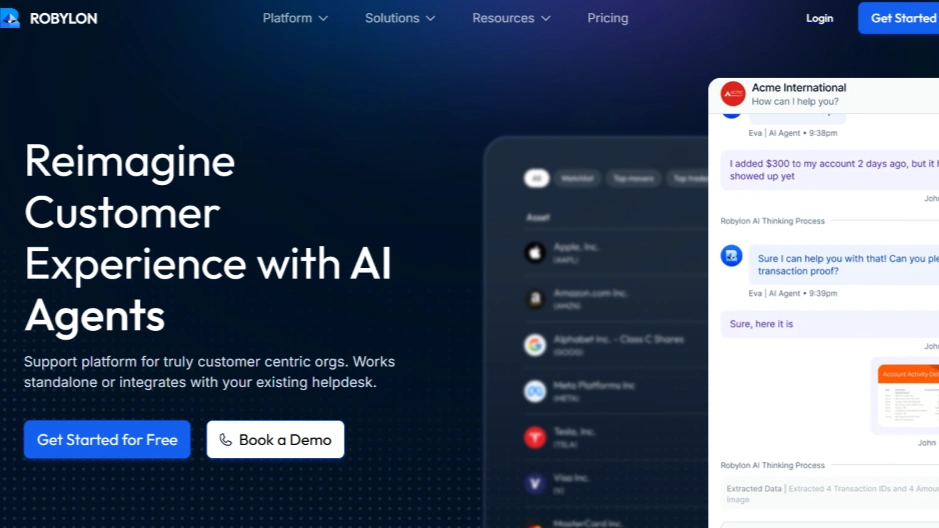
Robylon provides autonomous AI agents across chat, voice, tickets, and social. With WhatsApp AI agents, brands can run personalized inbound support and outbound sales campaigns from a verified channel that customers trust. The Voice AI agents handle live calls in real time, managing everything from support escalations to proactive outreach; whether it’s nudging a lead to complete KYC or reactivating a dormant user. Together, these channels create a true omnichannel layer, where conversations flow seamlessly between multiple channels, all managed from a single platform.
Best Use Case – Teams wanting AI to resolve both sales and support queries end-to-end
Key Features
- Omnichannel (Chat, WhatsApp, Instagram, voice, email, and more)
- Ticketing + knowledge base ingestion
- CRM integrations (Salesforce, HubSpot)
- Custom workflows + analytics
Automation Notes – AI agents resolve 80–90% queries, escalate with context when needed
Pricing – Free; Starter $39/mo; Business $199/mo; Custom Enterprise plans available
Industry – Fintech, ecommerce, SaaS, logistics, consumer brands, crypto, gaming
Limitations – Newer brand vs. incumbents like Intercom/Zendesk
Why Better than Drift?
Robylon AI closes the gap with omnichannel agents that handle chat, WhatsApp, Instagram, Voice Calls, tickets, and knowledge base answers, all while escalating complex issues with full context. This means faster resolutions, deeper automation, and measurable cost savings that Drift simply can’t match, so both sales and support teams get end-to-end automation.
2. Zendesk

Zendesk is an enterprise-grade CX suite spanning chat, ticketing, knowledge base, and voice.
Best Use Case – Best for enterprises scaling complex support operations with SLAs and analytics
Key Features
- Omnichannel ticketing + chat
- Advanced reporting and QA
- Large app marketplace
- AI-powered self-service tools
Automation Notes – AI assists in ticket triage, routing, and content suggestions
Pricing – Suite Team $55/agent/month; Suite Growth $115/agent/month; Suite Professional $149/agent/month
Industry– Enterprise SaaS, telecom, retail, BFSI
Limitations – Overkill for SMBs; heavy to configure
Why Better than Drift?
Offers full-service management beyond conversational marketing
3. Freshchat (Freshworks)
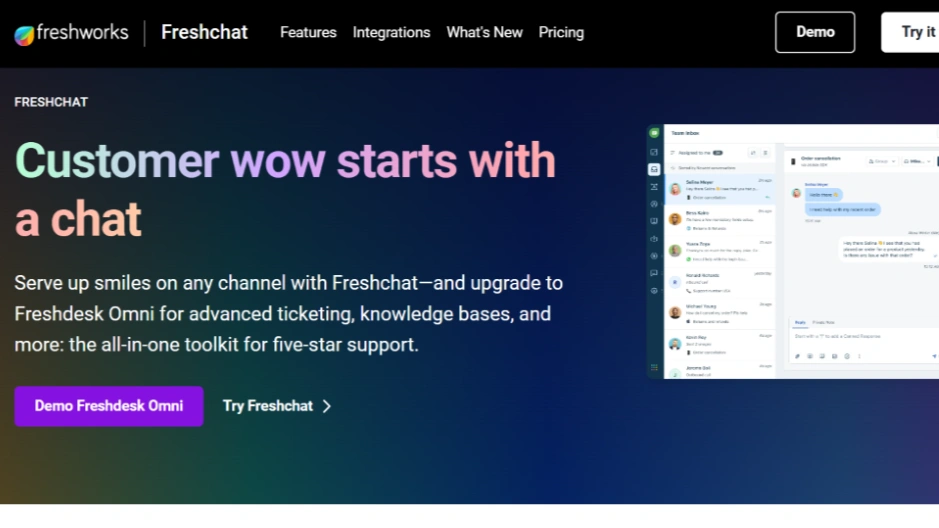
Freshchat is a modern messaging and bot platform inside the Freshworks suite.
Best Use Case – Teams needing omnichannel chat tied to ticketing and CRM
Key Features
- WhatsApp and mobile-first chat
- Freddy AI for FAQ automation
- IntelliAssign smart routing
- Shared inbox with Freshdesk sync
Automation Notes – Bots handle repetitive queries, escalate complex ones
Pricing – Free plan; Growth $19/agent/month; Pro $39/agent/month; Enterprise $69/agent/month
Industry – SMB to mid-market; ecommerce and SaaS
Limitations – Best if you adopt a broader Freshworks stack
Why Better than Drift?
Cheaper entry point and native ticketing integration
4. Tidio

Tidio combines live chat, chatbots, and Lyro AI for SMBs and ecommerce
Best Use Case – Best for fast deployment and affordable automation
Key Features
- Lyro AI agent for FAQ deflection
- Templates and visual flow builder
- Multichannel inbox (chat, email, social)
- Shopify and WordPress integrations
Automation Notes – AI learns FAQs, supports 12+ languages, and automates repetitive tickets
Pricing – Starter $24.17/month; Growth $49.17/month; Plus $749/month; Premium $2,999/month
Industry– SMBs, ecommerce stores
Limitations – Limited depth for enterprise workflows
Why Better than Drift?
Affordable and easier to deploy for smaller teams
5. Landbot
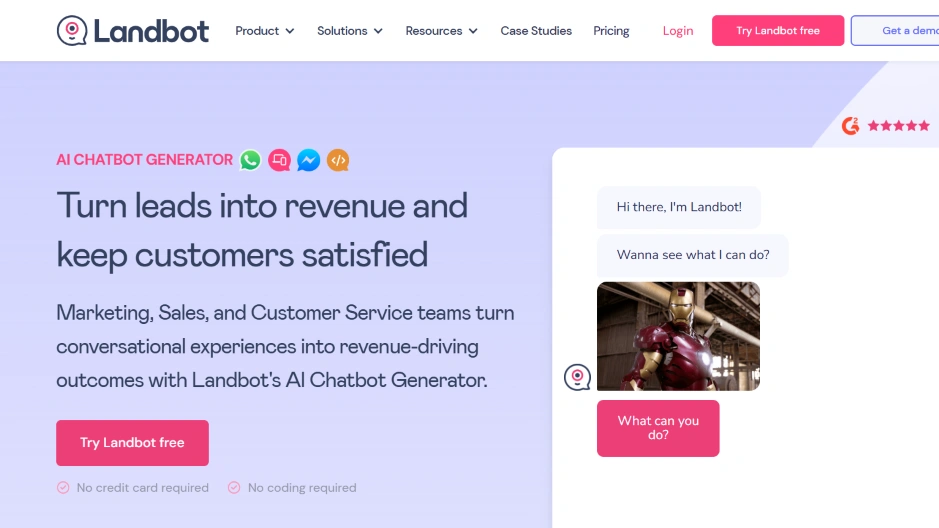
Landbot offers no-code chatbot creation with a visual builder.
Best Use Case – Marketers building lead funnels and guided chat flows
Key Features
- Drag-and-drop bot builder
- WhatsApp + web deployment
- Conditional logic for flows
- Rich media (GIFs, video) in chat
Automation Notes – Automates funnels without coding, simple AI enhancements
Pricing – Starter €32/month billed annually; Pro €80/month; Business €300/month
Industry– Marketing, lead-gen, agencies
Limitations – Limited analytics and enterprise scalability
Why Better than Drift?
Faster funnel setup with no coding required
6. LiveChat
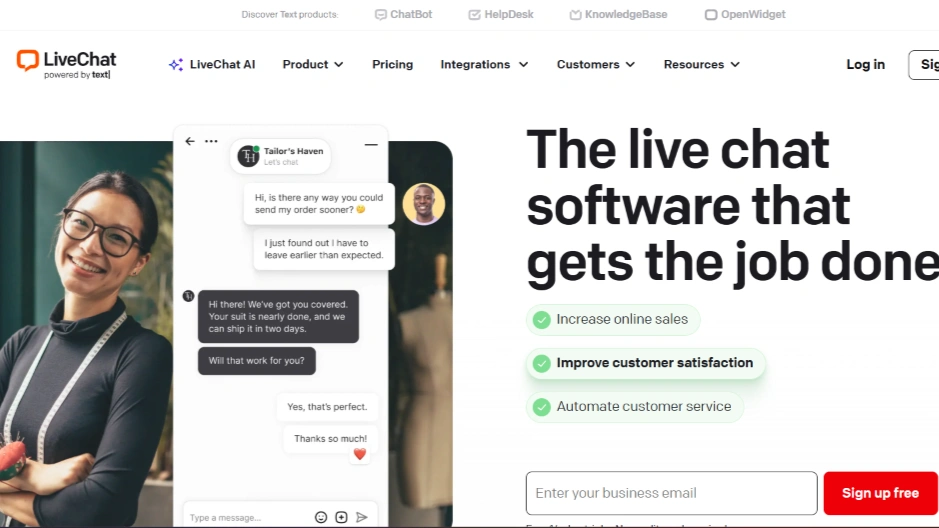
LiveChat is a polished website chat tool with strong agent productivity features.
Best Use Case – Businesses needing simple, reliable site chat
Key Features
- Customizable widget
- Reporting + goal tracking
- ChatBot and HelpDesk add-ons
- 200+ integrations
Automation Notes – Bots available via ChatBot add-on, not native
Pricing – Starter $20/seat/month; Team $41; Business $59; Enterprise custom
Industry– SMBs, mid-market, customer support
Limitations – Requires add-ons for a full helpdesk or AI
Why Better than Drift?
Easier setup, more polished UI for site chat
7. LiveAgent
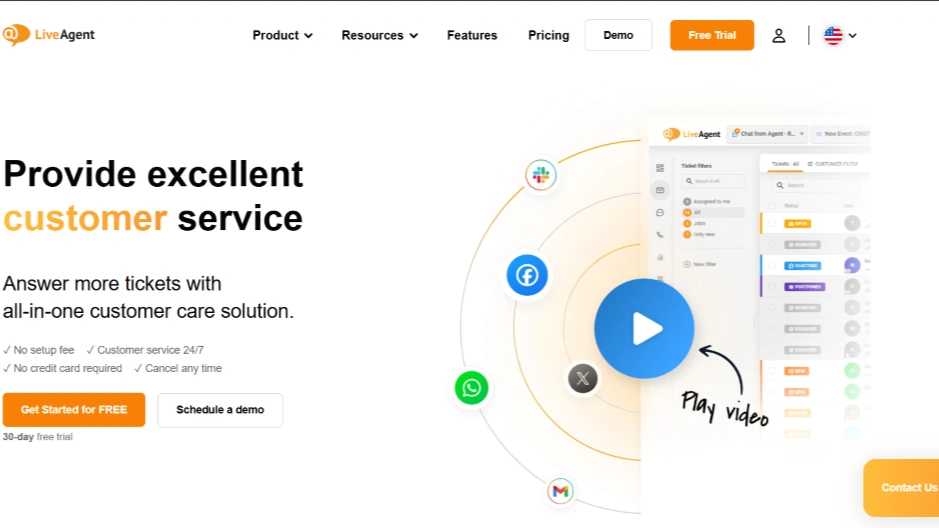
LiveAgent is an all-in-one help desk with chat, tickets, and a call center
Best Use Case – Support teams needing SLAs, omnichannel, and an affordable helpdesk
Key Features
- Omnichannel inbox (email, chat, voice)
- Call center with IVR
- SLA management tools
- Canned responses and macros
Automation Notes – Automates ticket routing and repetitive tasks
Pricing – Small Biz $15/agent; Medium $35; Large $59; Enterprise $85
Industry– Customer support-heavy businesses, BPOs
Limitations – Interface feels dated vs. newer platforms
Why Better than Drift?
Provides call center and SLA support, not just marketing chat.
8. HelpCrunch
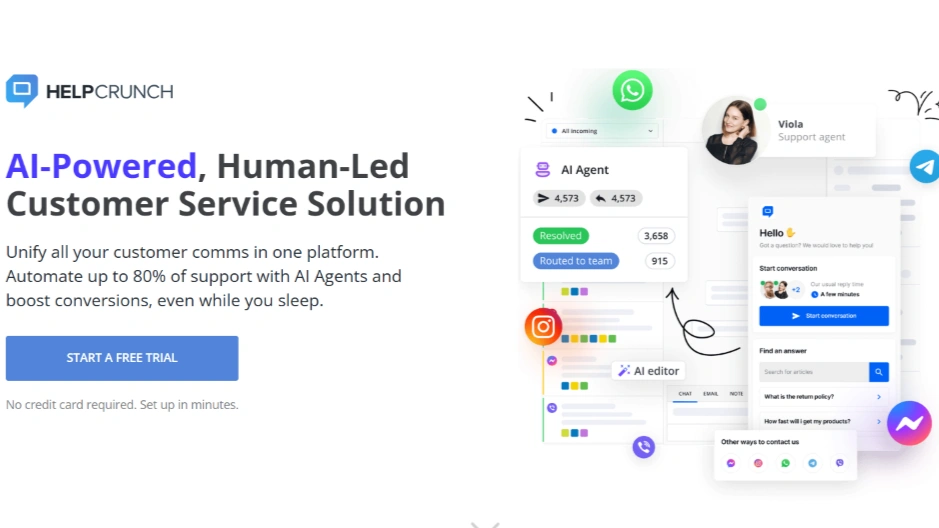
HelpCrunch unifies chat, email, and knowledge base in one affordable platform.
Best Use Case – Startups needing all-in-one CX on a budget
Key Features
- Live chat + email marketing
- Knowledge base with SEO support
- Multichannel messaging
- Auto-messages and simple bots
Automation Notes – Bots and email sequences automate outreach + support
Pricing – Basic $15/operator; Pro $25; Unlimited $620/month
Industry– SaaS startups, ecommerce SMBs
Limitations – Fewer advanced AI features than enterprise tools
Why Better than Drift?
Lower cost, covers email and chat in one
9. HubSpot Chat
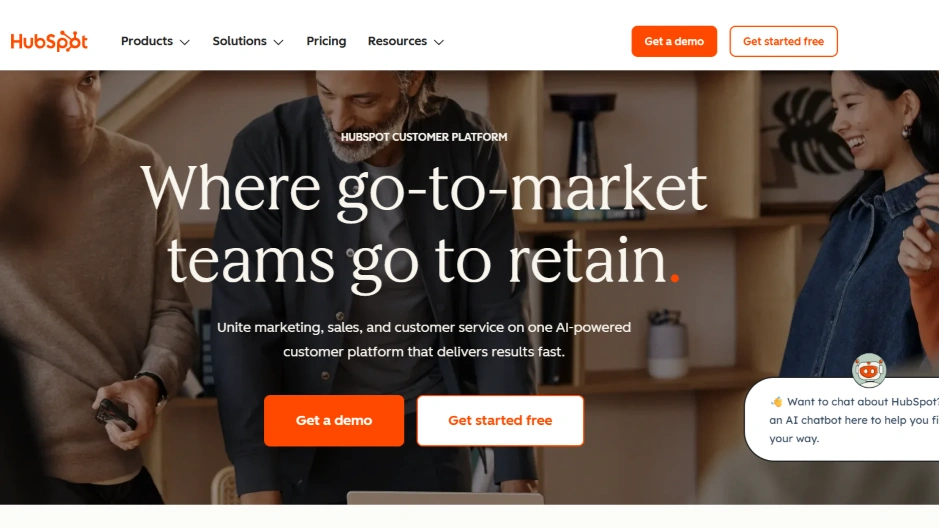
HubSpot Conversations ties chat and bots directly into HubSpot CRM.
Best Use Case – Inbound-heavy teams already on HubSpot
Key Features
- Free CRM-native chat
- Simple bot builder
- Shared team inbox
- Automatic transcript logging in CRM
Automation Notes – Mostly rule-based bots, with growing AI features
Pricing – Free with HubSpot CRM; paid hubs add advanced tools
Industry– SMBs, inbound marketing teams
Limitations – Limited if not using the HubSpot ecosystem
Why Better than Drift?
Zero-cost entry and tight CRM integration
10. Gorgias
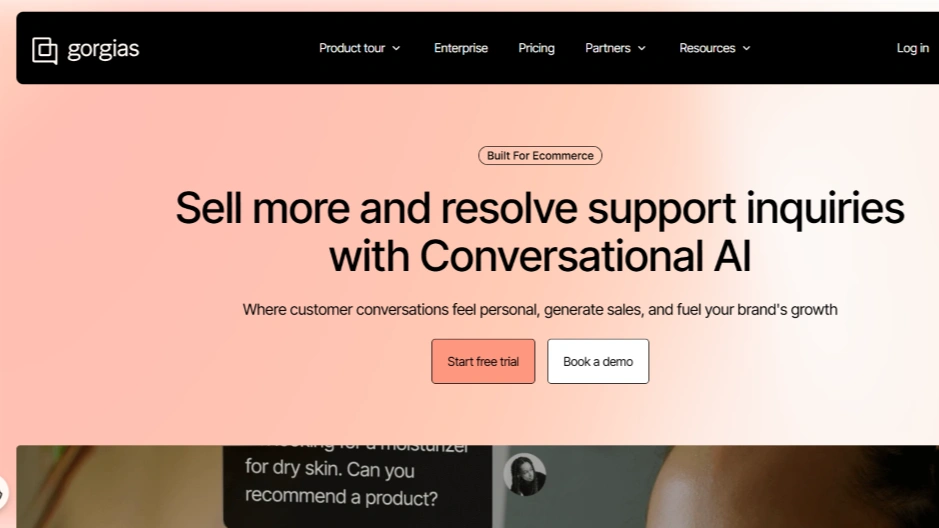
Gorgias is an e-commerce-focused helpdesk with chat and automation.
Best Use Case – Shopify, BigCommerce, and Magento stores
Key Features
- Deep Shopify/BigCommerce integration
- Refunds + macros for orders
- Social + email support in one inbox
- AI intent detection for retail queries
Automation Notes – Automates repetitive ecommerce tickets, routes high-value ones.
Pricing – Starter $10; Basic $60; Pro $360; Advanced $900/month
Industry Fit – D2C, ecommerce brands
Limitations – Narrow fit outside of ecommerce
Why Better than Drift?
Built for ecommerce workflows, Drift never covered
11. Intercom

Intercom is a customer engagement platform that offers live chat, AI-powered agents, and in-app messaging.
Best Use Case – Ideal for SaaS and product-led companies focused on lifecycle engagement and proactive onboarding.
Key Features
- Fin AI agent billed per resolution
- Proactive in-app nudges and tours
- Unified inbox with 250+ integrations
- Customizable chatbots for sales and support
Automation Notes – AI deflects FAQs and integrates with workflows, but pricing is usage-based
Pricing – Essential $39/seat, Advanced $99/seat, Expert $139/seat + $0.99/AI resolution
Industry Fit – SaaS, tech, and B2B software
Limitations – Costs rise sharply with traffic and add-ons
Why Better than Drift?
Stronger in-app engagement and lifecycle automation, not just lead capture.
11 Best Drift Alternatives You Need in 2025
Why Robylon Wins?
Teams need one place to run every conversation, automate what’s repeatable, and keep control as they scale, and here is how we deliver it
- True omnichannel – Chat, voice, email/tickets, WhatsApp, Instagram, and Social media managed from one platform.
- AI agents with workflows – Automate lead capture, qualification, knowledge base answers, and escalate with context.
- Faster setup – Ingest website, knowledge base, docs, and CRM with mapped data fields in days, not months.
- Enterprise-grade security – Token rotation, PII safeguards, audit trails, and granular role scopes.
- Proven outcomes – Real brands achieve faster resolutions, higher automation, and cost savings.
See how brands achieve 80-90% automation and cost savings with Robylon, a next-gen platform for customer conversations. View real results → customer-stories
Conclusion
Drift helped popularize conversational marketing, but by 2025, its limitations will have become impossible to ignore. The OAuth token breach, rising per-seat costs, and a narrow focus on sales-first chat workflows left many teams reevaluating whether Drift can still deliver the reliability and scale they need.
Today’s Drift alternatives go far beyond simple lead capture. Platforms like Zendesk and Intercom bring enterprise-grade ticketing, analytics, and lifecycle engagement. Tools such as Tidio and Landbot give SMBs affordable, fast-to-deploy automation. And AI-native providers like Robylon unify chat, voice, tickets, WhatsApp, and Instagram into a single stack that resolves both support and sales conversations end-to-end.
When choosing a replacement, the right fit depends on your business model
- SaaS and B2B companies benefit from in-app onboarding bots and CRM-first integrations
- Ecommerce and D2C brands lean on order tracking, returns, and social channel automation
- Fintechs need secure, compliant flows for KYC, repayment reminders, and fraud triage
- Logistics and mobility operators rely on real-time shipment updates and automated callbacks
Across all industries, the checklist stays the same: demand omnichannel coverage, transparent pricing, secure data handling, and AI that reduces the agent workload.
If your highest priority is having AI agents that resolve queries across chat, voice, ticketing, and more, all within a single unified stack, then testing Robylon should be one of your next moves. Book a demo to know more
FAQs
How to choose between Drift alternatives based on features?
Focus on your bottleneck
- Integrations: Pick HubSpot Chat if you’re all-in on HubSpot, or Zoho SalesIQ for Zoho.
- AI sophistication: Robylon AI and Intercom lead with AI-driven deflection and workflows.
- Ease of use: Tidio, Crisp, and LiveChat deploy quickly with minimal training.
- Enterprise depth: Zendesk and Freshchat scale with SLAs, analytics, and voice.
What are the pros & cons of using Drift vs its alternatives?
Pros of Drift: Strong sales chat, meeting scheduling, and deep CRM connections. Cons of Drift: Higher costs at scale, limited support/ticketing features, and security concerns
Alternatives often bring broader omnichannel coverage, built-in ticketing, affordable pricing, and AI-first automation features that Drift lacks.
Which chatbots can replace Drift for lead qualification?
Several platforms excel here. Robylon AI uses AI-SDR agents that qualify leads, capture documents, and escalate with context. Qualified specializes in Salesforce-first ABM chat flows. Intercom’s custom bots and Fin AI combine qualification with in-app engagement. Tidio’s Lyro bot handles FAQs and funnels leads for smaller teams.
Which Drift competitor has better pricing?
Pricing depends on team size and usage. Tools like Tidio and HelpCrunch offer budget-friendly plans for SMBs, while LiveChat and Freshchat provide predictable seat-based tiers. For enterprises, Zendesk and Intercom are costlier but deliver advanced workflows. Robylon AI offers transparent plans starting at $39/month with higher automation built in, often reducing total support costs compared to Drift’s per-seat model.
Will the alternatives listed replace all of Drift’s features?
Most will go further, they replicate lead qualification and chat, add voice, ticketing, multi-channel context, knowledge base automation, and stronger governance features.
Can an AI alternative match Drift’s lead-capture speed?
Yes, modern AI agents can respond in milliseconds, qualify leads, and route them to reps in real time. The difference is smarter escalation and unified handling of support, not just sales.
How long does it take to migrate off Drift?
With careful planning, many teams complete migration in 2–4 weeks: export data, map fields, run both systems side-by-side, test workflows, and then cut over. The key is running a parallel phase long enough to catch edge cases.
Which Drift alternative is best for small businesses?
For lean teams, Tidio and HelpCrunch offer strong feature sets at low price points. If you expect to scale fast, Robylon gives you room to grow without switching later.
Is Drift still safe to use after the 2025 OAuth breach?
Drift regained control by revoking compromised tokens and rebuilding security, but many teams see it as a warning. Any platform between your CRM and customers now must support token rotation, granular OAuth scopes, and full audit logs.

.png)



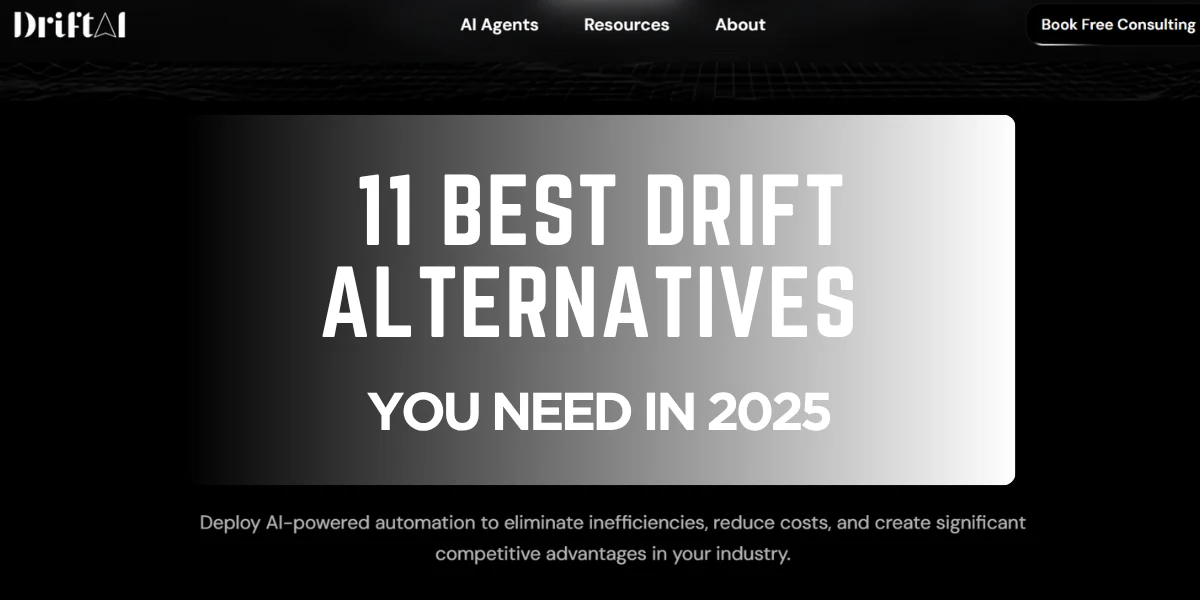
.webp)

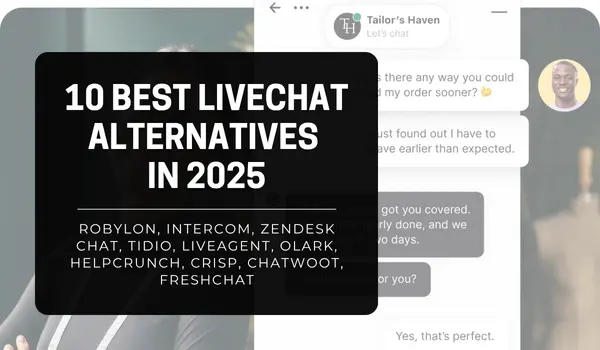
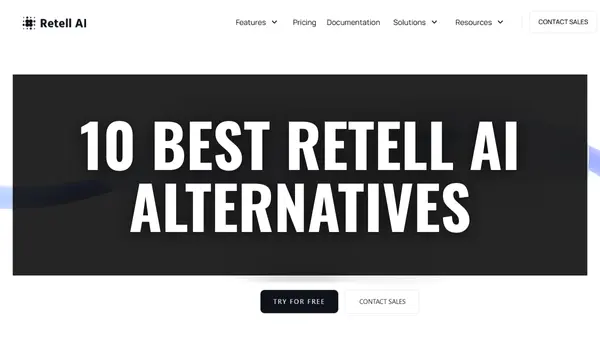

.webp)

